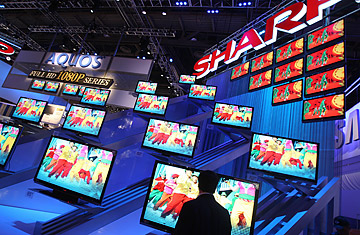
A man passes the Sharp HD television display at the 2008 Consumer Electronics Show in Las Vegas, Nevada.
In the consumer high-tech industry, it's all about the reveal. Technologies become outdated so quickly that electronics companies need massive momentum for sales during products' first few months on the shelves — and for that reason, if the annual Consumer Electronics Show in Las Vegas didn't already exist, someone would be sure to invent it. The biggest event of the year for gadget geeks, it's where early adopters go (or what they read about) to plan their wish lists for the upcoming year.
This year's CES runs Jan. 8-11 and the keynote speaker is Microsoft CEO Steve Ballmer. The conference will include 2,700 exhibitors flaunting their wares across 1.7 million square feet of floor space at the Las Vegas Convention Center and Sands Expo and Convention Center in the Venetian Casino and Hotel. The sponsoring Consumer Electronics Association, a trade group, expects 130,000 people to attend, including retailers, manufacturers and members of the press. (See TIME's Best Inventions of 2008)
But CES hasn't always been such a massive deal. The first show, held in New York City in 1967, fit cozily into showrooms at the New York Hilton and the Americana hotel. Around 20,000 people showed up, eager to see pocket-sized radios, televisions with integrated circuits and new tape recorder models. The following year, CES spread to nine floors across three New York hotels and attendees were buzzing about devices such as a tiny radio that could be worn on the wrist and a "Portable Executive Telephone" that cost more than $2,000, weighed 19 pounds and required users to obtain licenses from the Federal Communications Commission proving U.S. citizenship.
But over the years, as personal electronics became more affordable and ubiquitous, CES mushroomed. It offered a dramatic venue for the debut of some of the most important consumer technologies of the past 40 years, including the VCR (1970), cheap digital watches (1976) and affordable, albeit primitive, home computers (1978). 1981 was a banner year, with the debuts of the camcorder and the CD player. By 1973, CES had become so popular, organizers decided to put it on twice a year. It was held in Chicago from 1972 until 1977, when it started alternating shows between the Windy City and Las Vegas. It's been anchored firmly in Las Vegas once a year since 1995.
This decade has definitely seen some of the most memorable CES events in history. The Microsoft Xbox and the plasma TV were both unveiled in 2001. High-definition TV and Blu-Ray came along by 2003. When Bill Gates was demonstrating Windows Media Center at the 2005 CES, his on-stage computer crashed mid-demo; a few minutes later, a Microsoft employee got the "blue screen of death" when demonstrating another application. Chuckles and schadenfreude abounded.
When techies think about CES, they can't help but think of Gates. The former Microsoft CEO was the keynote speaker at 10 CES events, including in 2008, when he announced his retirement from day-to-day operations at the company. A video parody he screened of his last day at Microsoft featured cameos by Jon Stewart, Barack Obama and George Clooney, among others. (Apple's Macworld conference, typically hosted by Steve Jobs, takes place around the same time every year as CES.) Another highlight of the 2008 CES — at least for TV watchers — was a surprise appearance by a few of the stars of ABC's Lost, a show as synonymous with techie geek culture as, say, Battlestar Galactica. But just in case TV stars and Bill Gates' exit weren't enough to qualify as CES wow factor, there was still enough impressive gadgetry to create the kind of buzz the trade show is made for. Case in point: Panasonic's droolworthy 150-inch plasma TV.
CES organizers are obviously confident that cutting-edge consumer electronics will become even more ubiquitous in American life — they have Las Vegas dates booked through 2022.
(Read "What's Ailing Steve Jobs?")